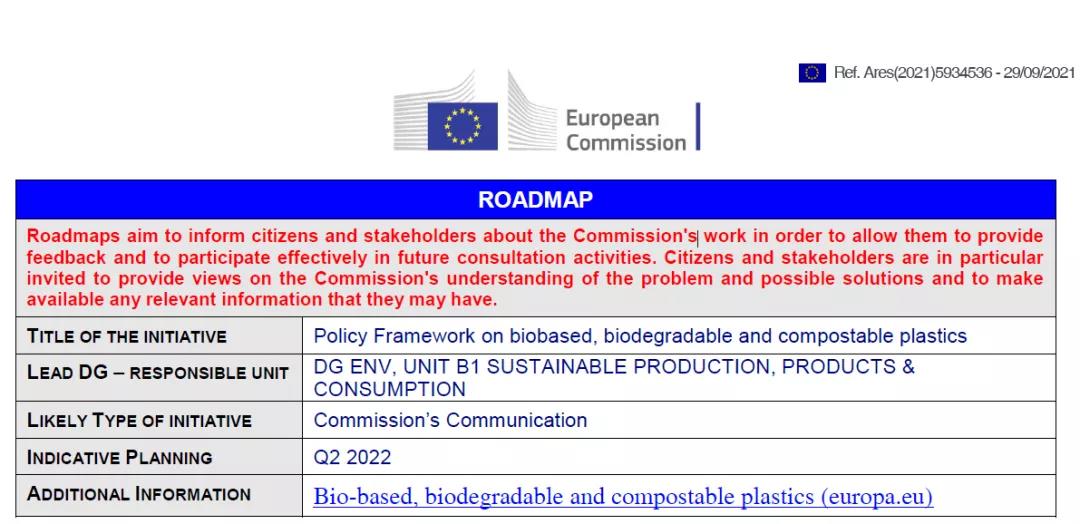On October 7, 2021, the European Commission, in an effort to facilitate the overall transition to a circular economy in the EU, announced that it will develop a clear policy framework that will enable the application of bio-based, biodegradable and compostable plastics. This will promote consistency in the development of European policies, enhance environmental protection, reduce consumer confusion, increase investment certainty in the internal market, and encourage competitiveness and innovation.

To this end, the European Commission announced on its official website that it would like to hear the public's views on the Commission's roadmap policy framework for bio-based, biodegradable and compostable plastics. The roadmap is open to the public until October 27, 2021 to further develop and fine-tune the program. The Committee will summarize the comments received in a summary report, explaining how the comments will be adopted or, if applicable, why certain recommendations cannot be adopted.
Purpose.
Announcing further targeted measures to address the sustainability challenges posed by this material and materials continues to drive the solution to plastic pollution. These include the development of an EU policy framework for bio-based (BBP), biodegradable and compostable plastics (BDCP) as a follow-up to the actions taken in the plastics strategy.
(1)Procurement-related sustainability challenges, labelling and use of bio-based plastics to ensure that their use delivers real environmental benefits in addition to reducing the use of fossil resources.
(2)The use of biodegradable and fertilizable plastics is based on the evaluation of applications where such use may be beneficial to the environment, as well as their standard applications.
The issues the initiative aims to address.
The Circular Economy Action Plan announces further targeted measures to address the sustainability challenges posed by this material and continues to promote a coordinated approach to tackling plastic pollution.
These measures include the development of an EU policy framework for bio-based (BBP), biodegradable and compostable plastics (BDCP) as a follow-up to the Plastics Strategy. BBP and BDCP have potential over fossil-based, non-however, biodegradable plastics, and whether and where these plastics are effective sustainable alternatives to conventional plastics needs to be carefully evaluated and the following challenges must be addressed.
(1) BBP and BDCP have similarities but also differences that make them challenging to understand; BBP is a plastic derived in whole or in part from biological feedstock. However, the term "biological" does not specify the actual "biological" content (how much biomass is in the product) of the BBP item.
(2) Biodegradable plastics are plastics with biodegradable properties, biodegradable only for biodegradable plastics, mainly industrial, composting facilities. However, the term "biodegradable" does not specify specifically whether these plastics are to be used in the post-use environment (compost, soil, water biodegradation, etc.) or the time frame (weeks, months, years) required for their biodegradation.
(3) It is possible for bio-based plastics to be non-biodegradable and for biodegradable plastics to be non-bio-based. Fossil-based. In practice, the term "bioplastics" is used to describe different materials, and when used, it is not clear whether it refers to their bio-based nature, their biodegradability, or both. As a result, consumers do not have access to clear and trustworthy information to decide on their purchases.
Basis for EU intervention.
The initiative is based on Article 192 (Environment) and Article 114 (Internal Market) of the TFEU. Environmental pollution is transboundary in nature, and fossil plastics are polluting the global ecosystem. Plastics are pollutants in industrial (or domestic) facilities can enter the open environment after improper disposal consumers and biodegradable plastics in soil may leak into waterways or oceans due to heavy rainfall biodegradation is not guaranteed, both cause transboundary environmental pollution through soil or waterways.
This also applies to plastics that claim to be "marine biodegradable" and for which there is no convincing evidence that they actually biodegrade under extremely diverse ocean and coastal diversity conditions without being harmful to marine life and without causing accumulation.
Therefore, EU action in this area is better suited to address this cross-border environmental and market issue. In addition, the measures taken by the EU will ensure a level playing field for economic operators actively engaged in the production of plastics and plastic recycling. In addition, the single market provides a critical mass enabling the EU to set standards in product design and sustainability and to influence global value chains. What the initiative aims to achieve, and how.

